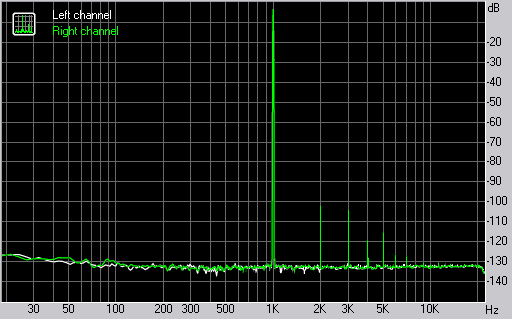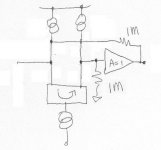1audio said:John:
Scott has not been forthcoming with the specifics you asked for.
I told John repeatably that over any reasonable range of "class A" bias beta was unchanged. It certainly will have nothing to do with the 7th. As you say the experiment is trivial to perform anyway. Yes, as a general purpose part the AD797 has to provide Ib compensation.
I think I have a picture that explains the operation of the circuit.
Should it be like this?
Attachments
dimitri said:
Should it be like this?
Jeez, I flipped the sense. The currents all add up the same way though. I hope this does not confuse anyone.
Yes, the currents add up for the same result. Thanks Dimitri.
PMA said:Most probably they are the same part, differ in some of cat specs.
This is correct, Walt Jung (I think) convinced them to do it. A more "bare bones" testing of same circuit.
The LT1115 is an LT1028 with looser DC specs. At least that's what they told me way back when.
John, I want to touch a bit the topic we discussed before...
Long time ago I read the story, unfortunately I don't remember the name and the author, I read Russian version.
One man landed on a beautiful planet. Grass, trees, flowers, creeks, blue sky, bright sun, birds... Birds were singing so nice so he laid down under the tree and started to repeat bird's singing. He was whistling when a local lady approached him. She was pleased by his whistling, and asked the permission to record the tune, and his name. "Did you invent the tune?" "No!" "Do you have the copyright for the tune?" "No!" "So, why are you whistling it?" "Because I like bird's singing and it is the pleasure to repeat after them!"
"You are kidding!", she said, "Birds are not singing!"
In short, they fell in love and married. She patented the tunes and got money, but he did not hear birds singing anymore... He was still famous, but could not invent, so people started making fun of him.
Finally, he decided to leave the planet and left a will signed that all his songs belong to all people on the planet, they can sing, play, whistle them for free, forever...
After that he discovered that birds started singing again. He left the planet leaving the most beautiful tune he ever heard to his ex-wife and all living creatures of the planet...
It was a great invention, transistor. But if it's inventors decided to patent common base, common emitter, and common collector usage of them, could we have such an electronics we have now?
Long time ago I read the story, unfortunately I don't remember the name and the author, I read Russian version.
One man landed on a beautiful planet. Grass, trees, flowers, creeks, blue sky, bright sun, birds... Birds were singing so nice so he laid down under the tree and started to repeat bird's singing. He was whistling when a local lady approached him. She was pleased by his whistling, and asked the permission to record the tune, and his name. "Did you invent the tune?" "No!" "Do you have the copyright for the tune?" "No!" "So, why are you whistling it?" "Because I like bird's singing and it is the pleasure to repeat after them!"
"You are kidding!", she said, "Birds are not singing!"
In short, they fell in love and married. She patented the tunes and got money, but he did not hear birds singing anymore... He was still famous, but could not invent, so people started making fun of him.
Finally, he decided to leave the planet and left a will signed that all his songs belong to all people on the planet, they can sing, play, whistle them for free, forever...
After that he discovered that birds started singing again. He left the planet leaving the most beautiful tune he ever heard to his ex-wife and all living creatures of the planet...
It was a great invention, transistor. But if it's inventors decided to patent common base, common emitter, and common collector usage of them, could we have such an electronics we have now?
Actually there are folks seriously considering how to update the patent system. The speed of innovation has overtaken the process. Circuit patents granted in 1949 would have expired long before they would have served as a serious impediment to most people working in the business and then you have the additional benefit of the ideas being forever in the public domain. Something should be done to stop the abuse of the system ala Lemelson and others (this represents my personal opinion only of course).
Personally I have a very radical opinion, just reduce the period of protection to 3-5yrs. Just enough time to put-up or shut-up.
Personally I have a very radical opinion, just reduce the period of protection to 3-5yrs. Just enough time to put-up or shut-up.
Darlington patented the darlington connecton. How about that. Richard Heyser almost beat him to it. Early enough, everything is new and fresh.
john curl said:Darlington patented the darlington connecton. How about that. Richard Heyser almost beat him to it. Early enough, everything is new and fresh.
So, I can feed MOSFET's source from pentode's cathode commercially, like I am doing now for the personal audiophilery, and nobody can sue me because Darlington's connection is free?
Nice bio on Darlington
http://www.ece.unh.edu/news/signals/1998/1998professor_darlington.html
I suspect the fact that Darlington invented his connection with some of the first few transistors available would have given him an advantage. This article contains a popular misconception, royalties cease when a patent expires unless there is a trademark, etc. involved, Darlington would not have collected royalties on every IC ever produced if he had patented putting more than one transistor on a die in 1949.
http://www.ece.unh.edu/news/signals/1998/1998professor_darlington.html
I suspect the fact that Darlington invented his connection with some of the first few transistors available would have given him an advantage. This article contains a popular misconception, royalties cease when a patent expires unless there is a trademark, etc. involved, Darlington would not have collected royalties on every IC ever produced if he had patented putting more than one transistor on a die in 1949.
scott wurcer said:Nice bio on Darlington
http://www.ece.unh.edu/news/signals/1998/1998professor_darlington.html
I suspect the fact that Darlington invented his connection with some of the first few transistors available would have given him an advantage. This article contains a popular misconception, royalties cease when a patent expires unless there is a trademark, etc. involved, Darlington would not have collected royalties on every IC ever produced if he had patented putting more than one transistor on a die in 1949.
In Russia we did not know his name, we knew a "Stacked Transistor", so instead of buying Russian vacuum tubes today (many of which were copied from RCA, Telefunken, Mullard, etc...) we would buy ICs from there if patent about more than one device on a die was enforced.
Edit: now in a Global Economy it is still the problem to enforce copyright and patent law so foreigners still have a kind of advantage.
scott wurcer said:
I told John repeatably that over any reasonable range of "class A" bias beta was unchanged. It certainly will have nothing to do with the 7th. As you say the experiment is trivial to perform anyway. Yes, as a general purpose part the AD797 has to provide Ib compensation.
I was trying to coax John past being so curmudgeonly and move to a more productive line of query.
I am interested in the bias compensation. The datasheet shows a relatively high input bias making the device pretty sensitive to imbalance in the dc returns on the input.
I think "getting the 7th out" is a worthy effort, but at some point its gone far enough. As for the open loop characteristics we should be able to get an idea by setting it for low gain and boosting the "noise gain" way up. Is there something that process would miss?
john curl said:Let me clarify my needs: I have 2 separate circuits that I have to optimize.
One circuit has a gain of about 30, and is used to amplify phono MC cartridges.
The other MIGHT have a gain of about 30, but is used as the front end of my ST 1700B analyzer.
One is for listening, the other is for measuring.
Measuring is always a challenge, and I want to get to below -130, if possible, with 7th harmonic being the MOST important harmonic that I don't want to see on the screen. I, now, have some 7th harmonic on the screen. How can I reduce this? Is it the fault of the AD797 or is it some other IC or component in the circuit?
Here is the loop through spectrum of a $140 sound card

You will see that it has a 7th at -128 dB with no special handling. The ST1700 has 9 opamps involved with the pre notch signal. The soundcard has possibly two. Getting the distortion out of the ST more than it is will require fiddling with each stage, or a prefilter. Or it may all be the oscillator side. And a small shift of phase could bump the residual up or down a lot if it's all near the same levels in each stage.
Distortion analyzers can easily be a thread unto themselves. I think I have 8 different designs in my collection.
Looks like you need a better microscope to see where its coming from.john curl said:Compromisers! In any case, it might not be the AD797 that is creating the 7th.
- Status
- Not open for further replies.
- Home
- Amplifiers
- Solid State
- John Curl's Blowtorch preamplifier


